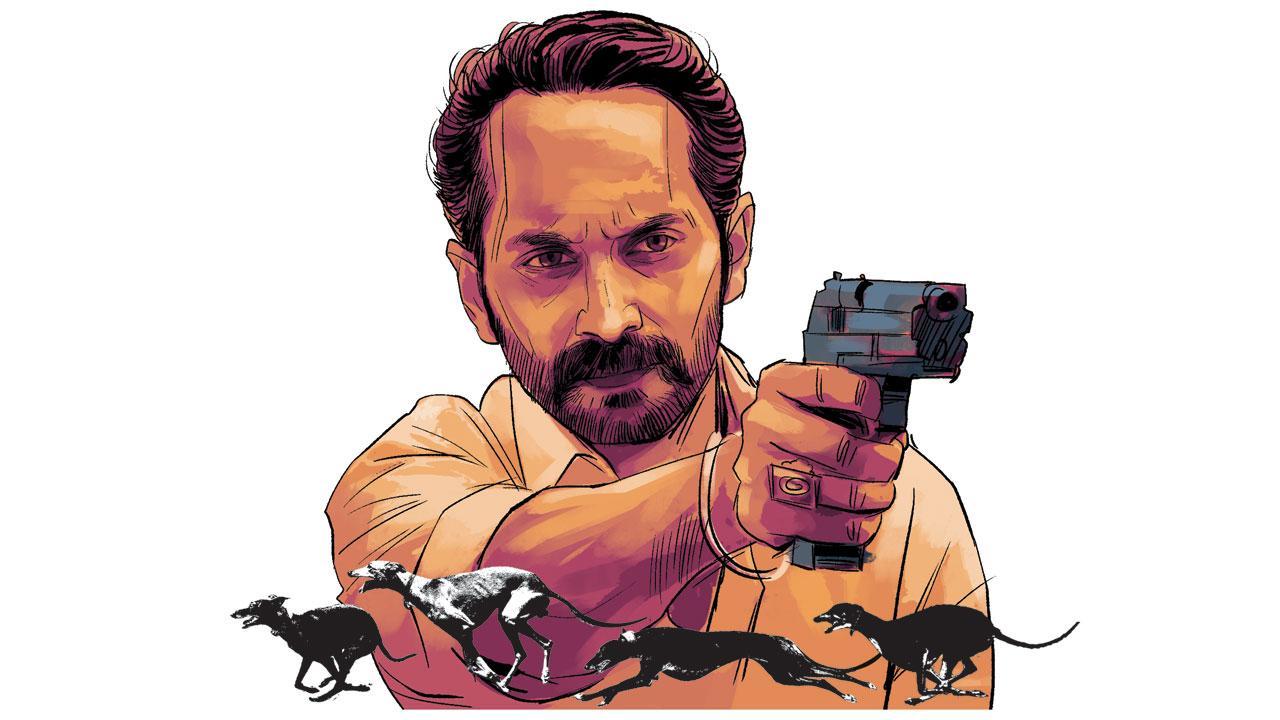This is a vital, powerful film on the continuing stranglehold of caste in today’s deeply backward India.

Illustration/Uday Mohite
![]() One of the more dramatic scenes in Mari Selvaraj’s third feature Maamannan (The Great Emperor, Tamil)—with a starry line up, including Fahadh Faasil, Udhayanidhi Stalin, Vadivelu and Keerthy Suresh—is a massacre. Spoiler alert: Knowing Selvaraj, the film’s key theme is the oppression of low castes by the high castes, but he cleverly subverts the standard Tamil action in one scene—instead of rowdies brandishing aruvals (machetes), an upper caste character sets a number of hounds to tear into the pigs being reared by a low caste man (spoiler ends). Selvaraj often uses powerful animal metaphors conveying layered meanings: not only is it a show of power for its own sake, as the pigs are minding their own business, but also how easy it is to set animal against animal—though both are controlled/exploited by their masters. The film—that follows his outstanding Pariyerum Perumal (The God on a Horse) and Karnan—is currently in theatres, also with English subtitled versions. This is a vital, powerful film on the continuing stranglehold of caste in today’s deeply backward India.
One of the more dramatic scenes in Mari Selvaraj’s third feature Maamannan (The Great Emperor, Tamil)—with a starry line up, including Fahadh Faasil, Udhayanidhi Stalin, Vadivelu and Keerthy Suresh—is a massacre. Spoiler alert: Knowing Selvaraj, the film’s key theme is the oppression of low castes by the high castes, but he cleverly subverts the standard Tamil action in one scene—instead of rowdies brandishing aruvals (machetes), an upper caste character sets a number of hounds to tear into the pigs being reared by a low caste man (spoiler ends). Selvaraj often uses powerful animal metaphors conveying layered meanings: not only is it a show of power for its own sake, as the pigs are minding their own business, but also how easy it is to set animal against animal—though both are controlled/exploited by their masters. The film—that follows his outstanding Pariyerum Perumal (The God on a Horse) and Karnan—is currently in theatres, also with English subtitled versions. This is a vital, powerful film on the continuing stranglehold of caste in today’s deeply backward India.
Upper caste Indians routinely heap a thousand atrocities on the low castes and tribals—the Bhima Koregaon case, their women are raped, their homes burnt (a video of a man peeing on a tribal boy’s face recently went viral); they are killed/attacked for entering villages or temples, drawing water from village wells; drinking tea from the same glass as everyone else, sitting on a chair while addressed by an upper caste person, or even riding a horse at their own wedding. A dramatic scene on the caste politics of sitting down forms the crux of the film, played out between father Maamannan (Vadivelu) and son Athiveeran (Udhayanidhi Stalin). Although he is an MLA from a reserved constituency, Maamannan stands obsequiously before the upper caste Rathnavel (Fahadh Faasil), whose father gave him a party position, and is mentally still their slave, while Athiveeran, who orders him to sit down, is estranged from him precisely because the father doesn’t stand up for himself or his son. When Vadivelu sat down, the theatre in Mumbai erupted with cheers. Selvaraj explores a bitter contradiction of caste politics: relatively how little political parties standing for social justice actually do for Dalits long term, and how little Dalits are able to do for themselves, even when they get power. Udhayanidhi Stalin, of course, is current Tamil Nadu Minister for Youth Welfare and Sports Development, and MLA, son of TN chief minister MK Stalin and grandson of DMK patriarch M Karunanidhi; his Red Giant Movies has produced about 17 films, including Maamannan), and he has acted in about 18 films, cementing Tamil Nadu’s decades-old penchant for turning film stars into ministers. Maamannan is also a counterpoint to the upper caste supremacist film Thevar Magan (1992); and Vadivelu’s casting is deliberate—there he played the lowly servant Isakki, whose hand was chopped off for opening a temple door; here he’s an MLA.
While Pari in Pariyerum Perumal chose to study law and discuss issues when addressing caste violence; Dhanush in Karnan realised only a smash-and-grab approach will work if the low castes want power; but Maamannan’s screenplay, by Selvaraj, has the low castes go back to reasserting their faith in democratic elections and education to address caste oppression (students campaign for Vadivelu). Framed as a political thriller, the film is well directed, but sags in the second half with a predictable climax. The film uses images of the Buddha, BR Ambedkar and Che Guevara. Selvaraj’s heroines rarely have much to do; ditto here, despite Keerthy Suresh being an upper caste woman, who runs free coaching classes for the poor. When you cast a sitting minister (pun intended) and producer as your hero, no one is expecting his acting skills to carry the film, and Selvaraj smartly casts counterfoils Fahadh Faasil (brilliant Malayalam star-actor, as Rathnavel), and Vadivelu (a comic actor who brings gravitas to his dramatic role as Maamannan, who is usually called Mannu, meaning mud). Theni Eswar’s cinematography gives the film propulsive energy; and RK Selva’s editing could have been more taut. AR Rahman’s music has a range from grand symphonies, to the ballad-like Raasa Kannu. Yuga Bharathi’s lyrics are compelling. The women crew’s contribution includes costume designer Sowbaranika Dhanabalakrishnan and Nandini Karky’s sensitive English subtitles, but is minuscule overall. Film is definitely recommended.
Meenakshi Shedde is India and South Asia Delegate to the Berlin International Film Festival, National Award-winning critic, curator to festivals worldwide and journalist.
Reach her at meenakshi.shedde@mid-day.com
 Subscribe today by clicking the link and stay updated with the latest news!" Click here!
Subscribe today by clicking the link and stay updated with the latest news!" Click here!










